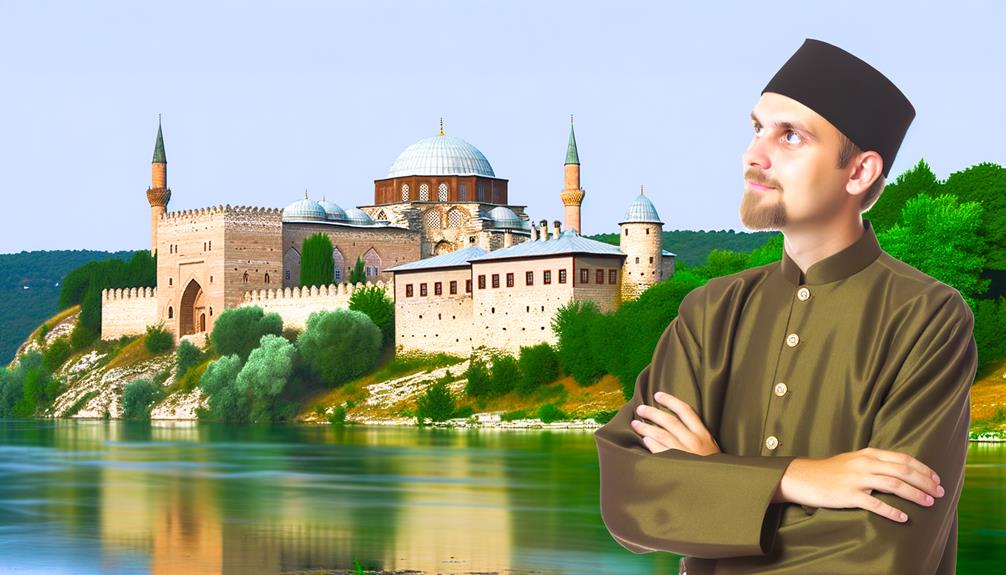Meaning of the Name Osman
The name Osman, rooted in the Arabic name 'Uthman,' translates to 'trustworthy' and 'protector.' This name carries significant historical and cultural value, as it was famously borne by Osman I, the founder of the Ottoman Empire. Over time, the name has come to symbolize reliability, strategic acumen, and visionary leadership.
Its use remains prominent in regions with historical ties to the Ottoman Empire, such as Turkey. Renowned figures named Osman have left enduring legacies across art, governance, and social structures.
Exploring further will uncover the cultural and historical depths associated with the name.

Key Takeaways
- The name Osman originates from the Arabic name 'Uthman,' meaning 'to be trustworthy' or 'to be safe.'
- Osman I founded the Ottoman Empire, significantly influencing world history.
- The name symbolizes valor, leadership, and reliability in various cultures.
- Osman is historically significant in Middle Eastern and Balkan societies.
- Modern variations and popularity of Osman reflect regional cultural trends.
Origins and Etymology
The name Osman traces its origins to the Arabic name 'Uthman,' which is derived from the root 'ṯ-m-n' meaning 'to be trustworthy' or 'to be safe.' In the context of Arabic linguistics, the root 'ṯ-m-n' signifies reliability and protection, underscoring the inherent qualities associated with the name.
The transformation from 'Uthman' to 'Osman' is primarily attributed to phonetic and regional variations in pronunciation and transliteration across different languages and cultures. The name has been prevalent in various Islamic societies, highlighting its widespread acceptance and the values it embodies.
It is essential to recognize that names, particularly those with such profound meanings, often carry significant cultural and linguistic heritage, influencing their adoption and adaptation across regions.
Historical Significance
Understanding the historical significance of the name Osman necessitates an exploration of its impact on various cultural and political landscapes, particularly within the context of the Ottoman Empire. Osman I, the empire's founder, established a dynasty that profoundly shaped world history. His leadership and military strategies laid the groundwork for an empire that spanned three continents and lasted over six centuries. This period saw significant advancements in various fields, from architecture to governance.
| Aspect | Significance |
|---|---|
| Founding Leader | Osman I established the Ottoman Empire. |
| Military Strategy | Innovative tactics that expanded the empire's territory. |
| Governance | Implemented a system that influenced future empires. |
| Cultural Influence | Patronage of arts and sciences, leading to the Ottoman Renaissance. |
| Longevity | The dynasty lasted over 600 years, impacting numerous subsequent societies. |
Osman's legacy remains a pivotal chapter in global history.
Cultural Impact
In examining the cultural impact of the name Osman, one must consider its enduring influence on art, literature, and social identity across various regions. The name Osman, deeply rooted in Turkish and Islamic traditions, frequently appears in classical poetry, symbolizing valor and leadership.
Ottoman architecture and artworks often celebrate figures named Osman, reflecting their societal prominence. Additionally, the name permeates folk tales and modern narratives, reinforcing its cultural resonance.
In various Middle Eastern and Balkan societies, the name Osman is a marker of heritage and lineage, influencing naming conventions and social structures. This cultural embeddedness underscores the name’s significant role in shaping and maintaining collective identities over centuries. The origins of the name Osman can be traced back to the founder of the Ottoman Empire, Osman I, whose legacy and influence continue to be felt in the region. The name Osman has become synonymous with the history and traditions of these societies, embodying a sense of pride and connection to the past. In a similar vein, the origin of the name amar holds great significance in shaping the cultural and social fabric of these communities, reflecting the enduring importance of ancestral heritage.
Notable Figures Named Osman
Among the notable figures named Osman, Osman I stands out as the founder of the Ottoman Empire. His leadership laid the groundwork for one of history's most influential dynasties. His strategic acumen and visionary governance allowed the nascent state to expand and consolidate power in the late 13th and early 14th centuries.
Another significant figure is Osman II, an Ottoman Sultan known for his attempts at military and administrative reforms. However, his reign was cut short by internal strife.
Additionally, Osman Hamdi Bey, an eminent Ottoman painter, archaeologist, and museum curator, made lasting contributions to Turkish art and cultural heritage.
Each of these individuals, bearing the name Osman, has left an indelible mark on history through distinct yet impactful legacies.
Modern Usage
In contemporary culture, the name Osman has seen fluctuating popularity, influenced by global and regional trends. Variations in the name's spelling and pronunciation are observed across different regions, reflecting local linguistic nuances.
Additionally, several celebrities named Osman have contributed to the name's visibility and modern relevance.
Popularity in Contemporary Culture
The name Osman has experienced fluctuating levels of popularity in contemporary culture, influenced by factors such as historical significance, media representation, and cultural trends. In regions with deep historical ties, such as Turkey, the name remains relatively common, reflecting its enduring cultural resonance. Conversely, in Western nations, its popularity has been more sporadic, often tied to periods of increased cultural exchange or media exposure.
| Region | Historical Significance | Media Influence |
|---|---|---|
| Turkey | High | Moderate |
| Middle East | Moderate | Low |
| Europe | Low | Moderate |
| North America | Low | High |
| Central Asia | High | Low |
Understanding these dynamics provides insight into the socio-cultural factors that shape the name's contemporary relevance.
Variations Across Regions
Frequently, the name Osman manifests distinct variations across regions, reflecting unique linguistic, cultural, and historical contexts in modern usage.
In Turkey, the name retains its original form, “Osman,” honoring its deep-rooted Ottoman heritage.
In Arabic-speaking countries, it is commonly rendered as “Uthman,” aligning with its etymological origins.
In the Balkans, particularly Bosnia and Herzegovina, the name appears as “Osmann” or “Osmanović,” the latter reflecting Slavic influences through the adoption of patronymic suffixes.
In Western contexts, transliterations such as “Osmond” have emerged, influenced by phonetic adjustments for ease of pronunciation.
These variations illustrate how the name adapts while preserving its historical and cultural significance, demonstrating the interplay between linguistic evolution and regional identity.
Celebrities Named Osman
Among contemporary figures, several celebrities named Osman have achieved prominence in various fields, thereby demonstrating the name's enduring appeal and versatility.
Osman Khalid Butt, a notable Pakistani actor and writer, has garnered acclaim for his performances in television and film, significantly impacting South Asian media.
In sports, Osman Sow, a Swedish footballer, has made his mark in European leagues, showcasing athletic prowess and dedication.
Additionally, Osman Yousefzada, a British fashion designer of Afghan heritage, has been influential in the fashion industry, known for his innovative designs and cultural narratives.
These individuals exemplify the diverse arenas in which the name Osman thrives, reflecting both cultural richness and multifaceted talent. This modern usage underscores the name's broad resonance and adaptability.
Symbolism and Meaning
The name Osman carries substantial historical significance, particularly in its association with the founding of the Ottoman Empire. Its cultural interpretations vary across regions, often symbolizing strength, leadership, and legacy.
This section will analyze how these attributes have been ingrained in the name's historical context and cultural narratives.
Historical Significance
Osman, a name deeply rooted in history, symbolizes leadership, strength, and the foundational ethos of the Ottoman Empire. The name is most prominently associated with Osman I, the founder of the Ottoman dynasty, whose vision and military prowess established a vast empire that endured for over six centuries.
Osman's leadership qualities and strategic acumen are emblematic of the name's historical significance. His legacy is not only in territorial conquests but also in the administrative and cultural frameworks he instituted, which influenced successive generations.
The name Osman, hence, carries connotations of pioneering spirit and enduring influence, reflective of its bearer's monumental impact on history. This historical resonance continues to imbue the name with a sense of gravitas and respect.
Cultural Interpretations
Embodying a rich tapestry of cultural symbolism, the name Osman is often interpreted as a representation of authority, resilience, and visionary leadership across various societies.
In Turkish culture, Osman is synonymous with the establishment of the Ottoman Empire, embodying the ideals of foundational strength and enduring legacy.
Arabic traditions often associate the name with wisdom and fortitude, reflecting its roots in the Arabic word 'Uthman.'
Additionally, in the Balkans, where Ottoman influence was significant, the name carries connotations of governance and strategic acumen.
This multifaceted interpretation highlights the name's ability to encapsulate a blend of historical and cultural virtues, making it a revered choice that transcends geographical and temporal boundaries.
Conclusion
To conclude, the name Osman possesses deep historical roots, significant cultural impact, and widespread modern usage. From its origins in the Arabic language, meaning 'bone-breaker' or 'chosen one,' to its historical prominence in the Ottoman Empire, Osman has left an indelible mark on various societies.
Notable figures and continued use in contemporary times underscore its enduring legacy. Truly, the name Osman has stood the test of time, weaving itself into the fabric of history and culture.






